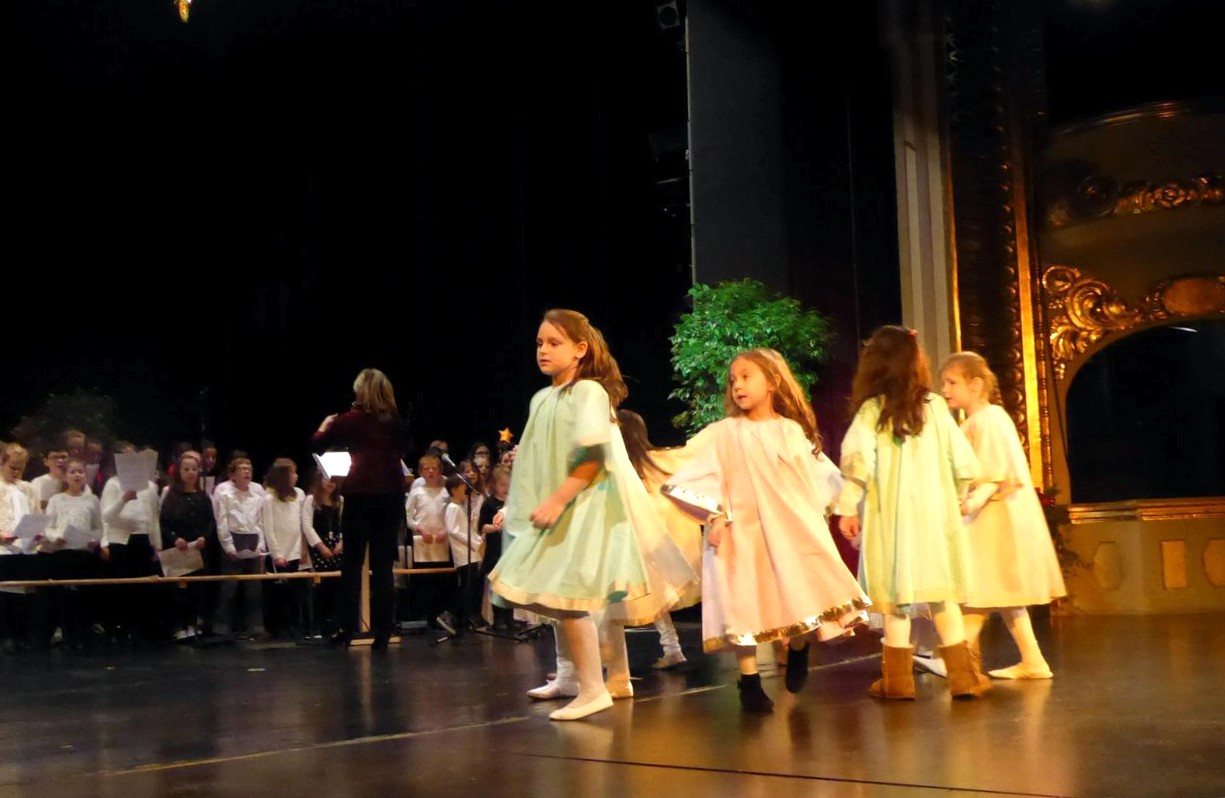Even stars have guardian angels

Stars are also no longer what they used to be. Maybe he just wasn’t paying attention for a moment or maybe he dozed off. Just before christmas, the rough star in the sky could not hold on any longer and fell down to earth. And yet, as always, he had wanted to shine over bethlehem when christ was born. Rough star, what now? Good advice is expensive, plotzlich rhymes with "bethlehem also a "problem. But the remedy is coming, and on wings. Apparently stars also have their guardian angels. They take the star and carry it on wings to its rightful place in the sky, so that it can shine again at the right time. Just in time. But you can rely on the guardian angels.
Of course, this is a harmless story – because you should not rely only on your guardian angels. But in 2007, peter schindler, pianist, organist, composer and music producer, turned it into a small musical play for children’s choirs, which in just a quarter of an hour offers the possibility of spreading a pre-christmas atmosphere without stables and oxen and donkeys, i.E. Beyond the usual nativity plays. The six songs are set in such a way that they do not overtax the children vocally and can be sung in one or more voices. The melodies are easy to remember – and one of them is already familiar: "vom himmel hoch da komm ich her" sing the angels as they transport the star to its place. You could actually rephrase the song: "up in the sky, I’ve got to go up there". At the end, everything is back in its place and in order. And this is also shown by the music: "finally the star is back, nothing is missing for christmas happiness" is a little good mood waltz.
"Rough star, what now?" Opened the afternoon concert in the spa theater, which brigitte and burkhard ascherl under the motto "advent and contemplative for large and small" to which they had brought three of their choirs: the children’s choir and the youth choir as well as the julifa choir. The kantorei is currently well occupied with the preparation for bach’s christmas oratorio on 16 december. December. And, of course, the children were first: one group played the dancing angels who save the star, the other sang in the background the songs that comment on the event. Brigitte ascherl had succeeded in getting the two groups to concentrate, because first performances in front of an audience – and then on a real theater stage – actually have an enormous distraction potential.
It has to be said, however, that one thing made it very challenging: the young people were accompanied by the state bath philharmonic orchestra. Christoph staschowski had arranged the piano accompaniment composed by peter schindler very lively and colorful for orchestra, and the troupe around bandmaster burghard toelke seemed to enjoy accompanying the angels and the choir. The youngest may not have noticed this or quickly forgotten it. But for the older ones, especially for the youth choir, making music together with an orchestra was certainly an interesting and important experience.
Then came the well-known and lesser-known songs. Burkhard ascherl conducted the julifa choir in john rutter’s "the most wonderful time" and loonis mcglohon’s "christmas season of joy. At irving berlin’s "white christmas" the choir loved to float on the soft chromaticism of the spiritual "it’s a birthday" he articulated the typical strong rhythmics.
The orchestra gave the singers a breather with a medley of christmas songs. The question of who wrote this entertaining arrangement must remain open. It was all the hits around the christmas tree: from "every year again" to "every year again" and "tomorrow the santa claus will come" about" O fir tree" or "es ist ein ros entsprugen" (a rose has sprung up) up to the triumphant "daughter of zion" and the ingredients were enough. And it was simply fun to listen, not only because everything was arranged in a very varied way, but also because the musicians kept away from any burdening christmas pathos and aimed at the cheerful side of the event.
The youth choir, again with piano accompaniment, showed what can be achieved with a good challenge of talents: with the strongly rhythmic "jubilate deo", broken down into individual syllables by jay althouse and the atmospheric spiritual "this little light of mine" – although it is not at all easy to clap rhythmically and still hold the notes. Together with the children they sang the two-part "stern uber bethlehem", whereby the youth choir took over the more difficult, because very high second voice. He did the same with "leise rieselt der schnee" by jay althouse, which was so well structured that it had the effect of softly ringing bells. As a common conclusion sung by all choirs and accompanied by the orchestra, john rutter once again had his say with "the star of bethlehem".
As an encore only one song was possible: "jingle bells". The audience clapped along. The star shone again. The advent season could begin.